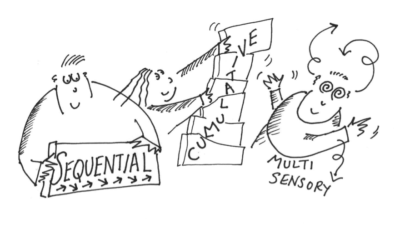
So what do you need to do?
You must become knowledgeable in order to help your child; to be able to be the advocate she or he will need at school, with their teacher and beyond.
There are several ways you can do this:
Books:
‘The Parents Guide to Specific Learning Difficulties’ by Veronica Bidwell.
The only book you’ll need!
Organisations:
Have a look at the main websites to do with Dyslexia etc; they have a lot of practical information. You can then decide whether you want the added advantages of becoming a member: magazines, handbooks, reduced rates etc.
- BDA: British Dyslexia Association
- Dyslexia Action
- Helen Arkell
- PATOSS
- NASEN
Parent Support Groups:
Most of these organisations have good local support groups.
Look up online what is available close to you. I go to the local PATOSS meetings (they are aimed at teachers but parents can go too) it is a brilliant way to meet others in your area involved with dyslexia and you will make good contacts and learn a lot.
In addition, the BDA has a list of tutors for each area, who may be able to offer help for your child.
If you live anywhere near the Helen Arkell Centre, near Farnham GU10 3BL, you could see what excellent courses they are running.
YouTube Videos:
Have a look at a few of the dyslexia information YouTube videos, which can give you a quick overview, such as the ‘Dyslexia Explained’ by Nessy.
Look at my ‘DyslexiaCatalyst’ animations which will be uploaded on to YouTube soon.
Training:
Each of the organisations have websites and if you join them then you will be sent information on the training that is available:
Webinars:
This is a very cost-effective way of becoming knowledgeable, as you will probably pay under £10 to have a lecture, with slides on various given topics. Often the speakers are the best speakers around, who are difficult to hear ‘live’
I particularly like:
- Neil MacKay
- Gavin Reid
- Steve Chinn
- Fintan O’Regan
The target audience is usually teachers but parents can benefit too. It is usually very practical information and ideas which would help your knowledge-base and how you talk to the teachers and school.
Conferences:
When you become absolutely fascinated by the subject (the pathway in, is often through one’s own child!) then you might want to go to conferences which take place all round England, throughout the year.
There is only one problem, if you are paying for these yourself, and that is that it is an expensive occupation! (a rough guide is £150 a day)
I am very selective about which one’s I go to.
The most practical ones for parents might include courses run by:
The British Dyslexia Association
Helen Arkell
NASEN
PATOSS.
Talking to other parents, books, webinars, training days, parent groups, YouTube videos, websites, conferences, it doesn’t really matter which way you find most useful, but greater knowledge is the best help you can give your child.